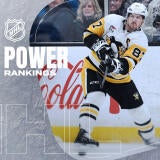2019 NHL Playoffs: Examining the controversial officiating that has plagued the playoffs
NHL officiating has hit a Code Red during this postseason
Complaining about officiating is as much a time-honored tradition as any trophy or tournament in sports. In the bag of annoying sports fan excuses, blaming the officiating is usually near the top of the pile.
But hockey fans watching this year's Stanley Cup Playoffs have had plenty of legitimate reasons to gripe. It seems as though the league's officiating practices have hit rock bottom during this postseason. There have been at least a handful of calls that have been mind-numbingly bad. And worse, several of them changed the outcome of games.
There typically seems to be a different rulebook for the regular season and the postseason, as officials sometimes swallow their whistles and overlook basic infractions in an effort to "let the boys play." That's often not such a bad thing, as the forgiving style can lead to a more intense, physical brand of hockey. But the scale of what the refs are willing to let go often changes from game-to-game, period-to-period, minute-to-minute. That inconsistency is what makes that frustrating.
Officials are never going to get everything 100-percent right, but this postseason has taken a violent tumble into Code Red territory with how many egregious calls there have been. As a result, we've seen big goals count when they should have been wiped out, and big goals wiped out when they should have counted. We've seen players thrown out of big games for nothing more than a minor penalty, and players given minor penalties for nothing less than a major infraction. It's truly been a tremendous mess and we're not even through the conference finals yet.
Here's a deeper look at some of the more notable controversial calls that have plagued this postseason.
Micheal Ferland's ejection
In Game 2 of the Capitals vs. Hurricanes opening round series, Micheal Ferland was given a five-minute major and a game misconduct for a checking the Capitals' Nic Dowd in the head. While you can certainly argue it was a penalty, the punishment was rather harsh considering Dowd was caught leaning and his head made contact with Ferland's back.
Michael Ferland gets ejected for a hit to the head on Nic Dowd and coach Rod Brind'Amour is livid pic.twitter.com/jafqrHo2Zz
— Brady Trettenero (@BradyTrett) April 13, 2019
Hurricanes coach Rob Brind'Amour was irate with the call in the aftermath and he explained why following the game.
"I thought it was a good hit," Brind'Amour said. "Originally, it did look bad, when you first watch it live. But then you watch it, and you see it, I get to sit and stare at it on the screen, he doesn't hit his head. The contact is, the first point of contact for sure, is not the head. That's frustrating. We lose a player, have to kill a five-minute penalty, that gets frustrating for sure."
Cody Eakin's major cross-check
With a little over 10 minutes to go in the third period of Game 7 in the Sharks vs. Golden Knights first-round series, Sharks season looked all but over. They were trailing 3-0 to a Vegas team in complete control when Golden Knights forward Cody Eakin delivered a cross-check to the chest of Joe Pavelski, knocking him off-balance and into Vegas' Paul Stastny. Pavelski landed awkwardly on the ice and was left bleeding. But this came an indirect result of Eakin's infraction -- i.e. the awkward collision with Stastny as Pavelski was off-balance.
A five minute major for this seems super excessive pic.twitter.com/TaLyyJHzqS
— Pete Blackburn (@PeteBlackburn) April 24, 2019
But officials seemed to discipline the play based on the optics of the result as opposed to the severity of the actual infraction from Eakin, which should have been nothing more than a two-minute penalty... if that.
On the ensuing five-minute power play, the Sharks scored four goals to climb back into the game -- one they ultimately won in overtime.
"It's a f---ing joke," Marchessault said of the official's decision to give a major after the game. "It's embarrassing. That's what it is."
For what it's worth, the league later admitted the call was wrong and took the two referees involved off assignment for the next round.
Puck in the netting
In Game 4 of the Bruins-Blue Jackets second-round series, Artemi Panarin scored a goal that was made possible after officials failed to blow a play dead after the puck went out of play. Prior to Panarin's shot hitting the back of the net, the puck quite clearly hit the netting above the boards, which should have resulted in referees blowing the whistle and setting up a face-off in the Boston zone.
However, officials apparently didn't see it and Oliver Bjorkstrand was able to gather the puck and put a shot on net. Panarin put home the rebound for the Blue Jackets' first goal of the game.
Puck hits the netting but nobody notices, Panarin capitalizes to get the Jackets on the board pic.twitter.com/2KyTDHE0RB
— Heart of NHL (@HeartofNHL) May 3, 2019
That play wasn't eligible for review because, per the NHL rulebook, a goal that comes after a puck hits the netting can only be overturned if it directly travels into the goal after going out of play.
The McAvoy hit
In Game 6 of that same series, Charlie McAvoy delivered a pretty ugly hit to the head of Blue Jackets forward Josh Anderson. It came at a pivotal moment as Columbus was trailing by one goal in a potential elimination game with a little more than 20 minutes left in their season.
With the principle point of contact being the head, it was believed McAvoy -- one of the Bruins' best defensemen -- might get a major penalty and a game misconduct as a result of the bad hit. However, officials only handed out a two-minute minor.
Bruins’ McAvoy lays out Blue Jackets’ Anderson with a controversial hit late in the second period of Game 6
— Hockey Night in Canada (@hockeynight) May 7, 2019
Thoughts on the minor penalty call? 🤔 pic.twitter.com/zSMqrhLOKM
Oddly enough, the NHL rulebook doesn't even have a provision for major penalties under the Illegal Check To The Head section. It seems like that should be one of the most obvious infractions to potentially carry a major, but the rulebook only says that an official can issue a match penalty if they determine that the checking player had intent to injure.
The referees on the ice in Game 6 didn't believe that McAvoy wanted to hurt Anderson, so he was only given a minor. However, when you consider the fact that Ferland received a match for a much less severe infraction (above) and that McAvoy was later suspended one game as a result of this hit, it seems fair to say the Blue Jackets were jobbed of a potential game-altering major penalty due to the stupidity of the rulebook.
Landeskog's offside
In the second period of Game 7 between the Sharks and Avalanche in round two, Colorado appeared to score the game-tying goal when Nathan MacKinnon found Colin Wilson for the one-timer in front of the Sharks' net. However, that goal was wiped off the board when San Jose challenged the play for offside and officials determined that Gabriel Landeskog didn't tag up to the blue line or get off the ice before the Avs entered the zone.
There didn't seem to be thoroughly conclusive evidence to overturn the call, though you can argue that Landeskog should have shown more awareness by getting to the bench quicker.
But this ruling essentially embodies what so many people hate about the offside review in its current state. Landeskog was about 100 feet away from the puck and had no significant impact on the development of the play that led to the goal. The spirit of the offside rule is to prevent attacking teams from gaining an unfair advantage behind the defense. Landeskog did no such thing.
It then gets extra confusing when you consider the fact that Landeskog was considered to be on the ice enough for the goal to be ruled offside, but not on the ice enough for the Avs to get whistled for "too many men." It's contradictory.
Meier's hand pass
In overtime of Game 3 of the Western Conference Final between the Sharks and Blues, San Jose got another lucky break when officials missed a hand pass that led to Erik Karlsson's game-winning goal.
Karlsson's second goal that gave San Jose the 5-4 victory in a swing game shouldn't have counted. San Jose's Timo Meier clearly swatted the puck out of mid-air to help his team gain possession leading up to the goal.
After Meier batted down the puck with an open hand, Gustav Nyquist collected it and dished to Karlsson for the one-timer to end it.
The @SanJoseSharks take a 2-1 series lead with @ErikKarlsson65's second of the night. #StanleyCup pic.twitter.com/wEM36Zsgu6
— NHL (@NHL) May 16, 2019
The issue here is that officials should have blown the whistle after Nyquist touched the puck following Meier's hand pass. The NHL rulebook allows some discretion by the on-ice officials, but it's pretty clear that Meier's swat provided the Sharks with an advantage that allowed them to retain possession in the attacking zone. By the language of the rulebook, there should have been a stoppage for a hand pass, even if the puck grazed the leg of a Blues defender before Nyquist gathered possession.
It seems crazy to believe that no member of the on-ice officiating crew thought to blow the play dead after seeing Meier swat the puck but, as a result, it was ruled a good goal on the ice. Even crazier is the fact that the play wasn't eligible to be reviewed. There was nothing the Blues could do other than verbally protest a rather blatant missed call.


















